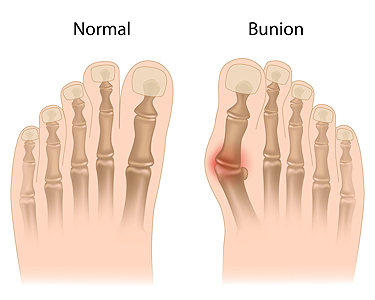Connect With Us
Blog
Items filtered by date: January 2025
Pickleball Injury Risk Factors

Pickleball injuries can arise from various risk factors, making awareness key to prevention. Age is a significant factor, as older players are more prone to strains, fractures, and joint issues due to natural wear and tear. Gender can also play a role. Studies suggest women may face higher risks of certain injuries, such as stress fractures, due to bone density differences. Poor technique or improper equipment, like unsupportive shoes, increases strain on the feet and ankles, heightening the chance of overuse injuries. Additionally, skipping warm-ups and stretching leaves muscles and joints unprepared for the quick movements pickleball demands, leading to sprains or muscle tears. Past injuries or playing on uneven or slippery court surfaces further amplify these risks, making recovery and safety harder to maintain. For any pickleball-related foot or ankle injury, it is suggested that you consult a podiatrist for expert care and guidance.
Sports related foot and ankle injuries require proper treatment before players can go back to their regular routines. For more information, contact one of our podiatrists of Front Range Podiatry. Our doctors can provide the care you need to keep you pain-free and on your feet.
Sports Related Foot and Ankle Injuries
Foot and ankle injuries are a common occurrence when it comes to athletes of any sport. While many athletes dismiss the initial aches and pains, the truth is that ignoring potential foot and ankle injuries can lead to serious problems. As athletes continue to place pressure and strain the area further, a mild injury can turn into something as serious as a rupture and may lead to a permanent disability. There are many factors that contribute to sports related foot and ankle injuries, which include failure to warm up properly, not providing support or wearing bad footwear. Common injuries and conditions athletes face, including:
- Plantar Fasciitis
- Achilles Tendinitis
- Achilles Tendon Rupture
- Ankle Sprains
Sports related injuries are commonly treated using the RICE method. This includes rest, applying ice to the injured area, compression and elevating the ankle. More serious sprains and injuries may require surgery, which could include arthroscopic and reconstructive surgery. Rehabilitation and therapy may also be required in order to get any recovering athlete to become fully functional again. Any unusual aches and pains an athlete sustains must be evaluated by a licensed, reputable medical professional.
If you have any questions please contact our office located in Littleton, CO . We offer the newest diagnostic and treatment technologies for all your foot and ankle needs.
The Pain of Plantar Fasciitis

Plantar fasciitis is a common condition that causes heel pain and results from inflammation of the plantar fascia, a thick band of tissue connecting the heel to the toes. Heel pain often develops from repetitive stress or overuse, particularly in people who spend long hours on their feet, such as healthcare workers, teachers, or retail employees. Poor footwear, tight calf muscles, or high-impact activities like running can worsen the problem. The pain can be sharp, especially with the first steps in the morning or after prolonged sitting. Addressing plantar fasciitis early is key to preventing it from becoming chronic. Rest your feet, stretch regularly, and wear supportive footwear. A podiatrist can assess your condition and recommend treatments like custom orthotics, targeted stretching, or night splints. For severe cases, treatments may include advanced therapies like corticosteroid injections, extracorporeal shockwave therapy, or surgery. If you have pain from plantar fasciitis, it is suggested that you schedule an appointment with a podiatrist for care.
Plantar fasciitis can be very painful and inconvenient. If you are experiencing heel pain or symptoms of plantar fasciitis, contact one of our podiatrists from Front Range Podiatry. Our doctors can provide the care you need to keep you pain-free and on your feet.
What Is Plantar Fasciitis?
Plantar fasciitis is the inflammation of the thick band of tissue that runs along the bottom of your foot, known as the plantar fascia, and causes mild to severe heel pain.
What Causes Plantar Fasciitis?
- Excessive running
- Non-supportive shoes
- Overpronation
- Repeated stretching and tearing of the plantar fascia
How Can It Be Treated?
- Conservative measures – anti-inflammatories, ice packs, stretching exercises, physical therapy, orthotic devices
- Shockwave therapy – sound waves are sent to the affected area to facilitate healing and are usually used for chronic cases of plantar fasciitis
- Surgery – usually only used as a last resort when all else fails. The plantar fascia can be surgically detached from the heel
While very treatable, plantar fasciitis is definitely not something that should be ignored. Especially in severe cases, speaking to your doctor right away is highly recommended to avoid complications and severe heel pain. Your podiatrist can work with you to provide the appropriate treatment options tailored to your condition.
If you have any questions, please feel free to contact our office located in Littleton, CO . We offer the newest diagnostic and treatment technologies for all your foot care needs.
Understanding Bunions

A bunion is a bony bump that forms at the base of the big toe, causing it to angle inward toward the other toes. This condition can lead to pain, swelling, and redness surrounding the joint, making it difficult to find comfortable shoes. As the bunion develops, it can cause the toes to become misaligned, leading to additional discomfort and potential problems with walking. The primary cause of bunions is often hereditary, but wearing tight, narrow shoes, especially high heels, can make the condition worse. Foot deformities, such as flat feet, can also increase the risk. A podiatrist can help diagnose and manage bunions. Conservative treatments may include custom orthotics, padding, or recommending footwear changes to reduce pressure. In more severe cases, this type of doctor may suggest surgical options to realign the joint and alleviate pain. If you have developed a bunion, it is suggested that you schedule an appointment with a podiatrist.
If you are suffering from bunions, contact one of our podiatrists of Front Range Podiatry. Our doctors can provide the care you need to keep you pain-free and on your feet.
What Is a Bunion?
A bunion is formed of swollen tissue or an enlargement of boney growth, usually located at the base joint of the toe that connects to the foot. The swelling occurs due to the bones in the big toe shifting inward, which impacts the other toes of the foot. This causes the area around the base of the big toe to become inflamed and painful.
Why Do Bunions Form?
Genetics – Susceptibility to bunions are often hereditary
Stress on the feet – Poorly fitted and uncomfortable footwear that places stress on feet, such as heels, can worsen existing bunions
How Are Bunions Diagnosed?
Doctors often perform two tests – blood tests and x-rays – when trying to diagnose bunions, especially in the early stages of development. Blood tests help determine if the foot pain is being caused by something else, such as arthritis, while x-rays provide a clear picture of your bone structure to your doctor.
How Are Bunions Treated?
- Refrain from wearing heels or similar shoes that cause discomfort
- Select wider shoes that can provide more comfort and reduce pain
- Anti-inflammatory and pain management drugs
- Orthotics or foot inserts
- Surgery
If you have any questions, please feel free to contact our office located in Littleton, CO . We offer the newest diagnostic and treatment technologies for all your foot care needs.
Symptoms and Causes for Ankle Osteoarthritis

Ankle osteoarthritis is a degenerative joint condition where the cartilage in the ankle joint breaks down over time, leading to pain, swelling, and stiffness. Symptoms typically include difficulty in moving the ankle, especially with activities like walking or climbing stairs, as well as a sensation of grinding or clicking in the joint. Pain may worsen with activity or in cold, damp weather. The main causes of ankle osteoarthritis include previous injuries, such as fractures or sprains, repetitive stress, or wear and tear from aging. Obesity and certain genetic factors can also increase the risk of developing this condition. A podiatrist can help manage ankle osteoarthritis by recommending lifestyle changes, targeted exercises, and custom orthotics to reduce joint strain. In some cases, anti-inflammatory medications, corticosteroid injections, or hyaluronic acid injections may be used to ease pain and inflammation. Surgery may be considered if conservative treatments do not provide relief. If you have any type of foot arthritis, it is suggested that you schedule an appointment with a podiatrist.
Arthritis can be a difficult condition to live with. If you are seeking treatment, contact one of our podiatrists from Front Range Podiatry. Our doctors can provide the care you need to keep you pain-free and on your feet.
Arthritic Foot Care
Arthritis is a term that is commonly used to describe joint pain. The condition itself can occur to anyone of any age, race, or gender, and there are over 100 types of it. Nevertheless, arthritis is more commonly found in women compared to men, and it is also more prevalent in those who are overweight. The causes of arthritis vary depending on which type of arthritis you have. Osteoarthritis for example, is often caused by injury, while rheumatoid arthritis is caused by a misdirected immune system.
Symptoms
- Swelling
- Pain
- Stiffness
- Decreased Range of Motion
Arthritic symptoms range in severity, and they may come and go. Some symptoms stay the same for several years but could potentially get worse with time. Severe cases of arthritis can prevent its sufferers from performing daily activities and make walking difficult.
Risk Factors
- Occupation – Occupations requiring repetitive knee movements have been linked to osteoarthritis
- Obesity – Excess weight can contribute to osteoarthritis development
- Infection – Microbial agents can infect the joints and trigger arthritis
- Joint Injuries – Damage to joints may lead to osteoarthritis
- Age – Risk increases with age
- Gender –Most types are more common in women
- Genetics – Arthritis can be hereditary
If you suspect your arthritis is affecting your feet, it is crucial that you see a podiatrist immediately. Your doctor will be able to address your specific case and help you decide which treatment method is best for you.
If you have any questions please feel free to contact our office located in Littleton, CO . We offer the newest diagnostic tools and technology to treat your foot and ankle needs.

